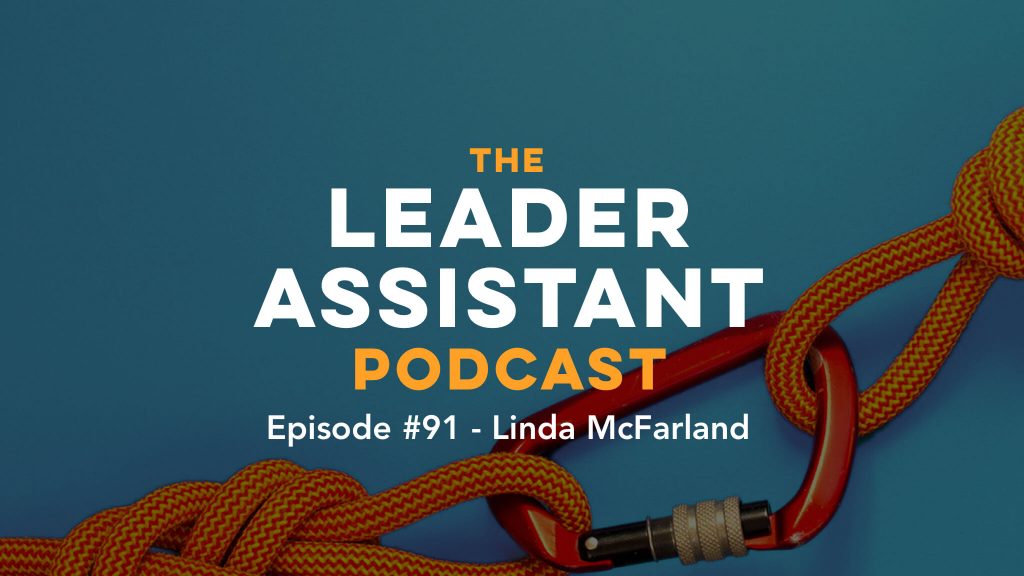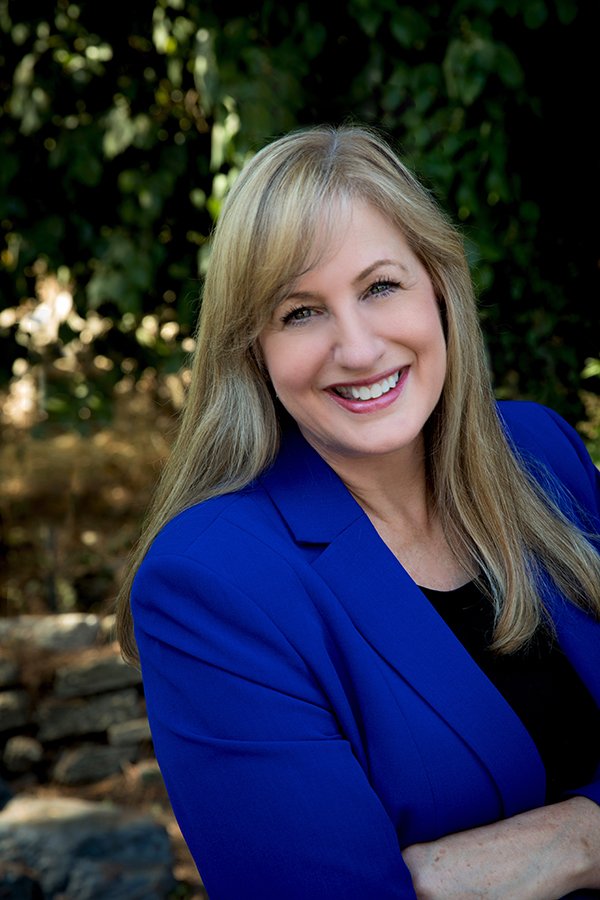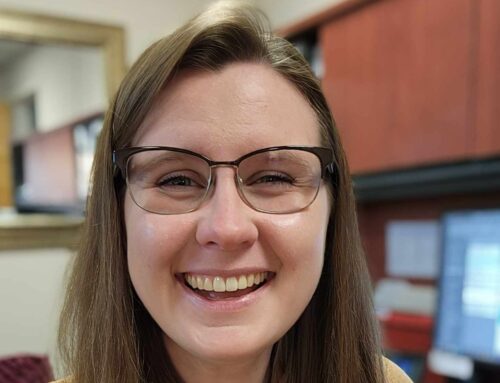Linda McFarland has supported a dozen CEOs in Silicon Valley and in this episode, Linda shares her decades of experience through stories that bring out the thoughtful lessons learned throughout her career.
Linda has more executive assistant experience than most, yet she is also one of the most humble Leader Assistants I’ve met. We chat about working at large and small companies, how your networking skills can impact your company’s bottom line, how to grow your confidence, manage conflict, and more!
LEADERSHIP QUOTE
If your actions create a legacy that inspires others to dream more, learn more, do more and become more, then, you are an excellent leader.
– Dolly Parton’s slight revision of a John Quincy Adams’ quote.
JOIN THE FREE COMMUNITY
Join the Leader Assistant Slack Community here, or the Facebook Group here for bonus content and to network with other assistants who are committed to becoming leaders!
CONNECT WITH LINDA
ABOUT LINDA
Linda McFarland brings her consummate professionalism, calm demeanor, and insightful sense of humor to her highly-acclaimed presentations and workshops. Having supported a dozen CEOs in Silicon Valley, Linda shares her decades of experience through stories that bring out the thoughtful lessons learned throughout her career. Her passion for sharing her knowledge and understanding with administrative professionals led her to launch a consulting company called Ascend2Success (now known as Linda McFarland Consulting) to develop educational and interactive training for administrative professionals, and become a published author (Linda’s most current book is “The Wizard Behind the CEO”). Learn more by visiting her website at lindamcfarland.com.
THE LEADER ASSISTANT BOOK
Download the first 3 chapters of The Leader Assistant: Four Pillars of Game-Changing Assistant for FREE here or buy on Amazon here.
SUBSCRIBE
Subscribe to The Leader Assistant Podcast so you don’t miss new episodes!
You can find the show on Apple Podcasts, Spotify, Google Podcasts, Pandora, and Stitcher.
Join my email list here if you want to get an email when a new episode goes live.
LEAVE A REVIEW
If you’re enjoying the podcast, please take 2 minutes to rate and review the show on Apple Podcasts here. Each review helps me stay motivated to keep the show going!
—
EPISODE TRANSCRIPT
Linda McFarland 0:00
Hi, I’m excited to be here. My name is Linda McFarland. And the leadership quote that I’d like to share with all of you is one of my very favorites. It’s by John Quincy Adams. And he once said, If your actions inspire others to dream more, learn more, do more and become more. You are a leader. And I think it’s interesting that Dolly Parton added a few words to this quote, she said, If your actions create a legacy that inspires others to dream more, learn more, do more and become more, then you are an excellent leader. It’s amazing how just a few words can make a quote even more compelling. So that’s what I wanted to share with you today.
Podcast Intro 0:48
The Leader Assistant Podcast exists to encourage and challenge assistants to become confident game changing leader assistant.
Jeremy Burrows 1:00
Hello, leader assistants. Thanks for tuning in to The Leader Assistant Podcast. It’s your host, Jeremy Burrows. And today I’m speaking with Linda McFarland, Linda, how’s it going?
Linda McFarland 1:09
Hey, I’m having a great day. How about you, Jeremy?
Jeremy Burrows 1:12
I’m doing good. It’s a little bit chilly here in Missouri. I mean, you’re in California. Is that right?
Linda McFarland 1:17
I am in the Sunshine State. Awesome. Awesome.
Jeremy Burrows 1:22
So let’s talk a little bit about kind of way back when in your very first job and maybe straight out of high school.
Linda McFarland 1:32
Yeah, I would love to tell you about my first job, it was pretty interesting, because I had this fascination for typing. I don’t know why. But back then. It was before keyboarding, and all that all the computer phase. But I had a friend whose aunt was looking for someone to work for the summer. And so what I did is I talked to her, and she liked me and figured she would give me a chance. So that summer I was 16. And I was her assistant. And she supported the president of the company. And so I was more like an office assistant or a junior admin. And I learned a lot about the interactions with the executive level, and the importance of professionalism. And I typed I am a really fast typist, I type about 150 words a minute. And so I was able to get a lot of work done and be super helpful to her in her role. And I also saw when I was in that role, the importance of her professionalism, and how much she knew she was really the go to person. And a lot of people came to her and asked a lot of questions. And she made a lot of decisions in the absence of her executive. And I was really impressed with, with what I saw on it made me more excited about being in the environment of an office and also supporting an executive which I had aspired to at a very young age. And from there, it’s history I, I kept going on that path.
Jeremy Burrows 3:14
Why do you think you aspire to it at a young age?
Linda McFarland 3:17
You know, I really enjoyed I was I came, I come from a very large family. And I was one of those that organized my brothers and sisters a lot. And I would put on events for our family from time to time. And I just like to be an organizer and get people excited about doing things and, and I was also the one in the family that would organize as we got older, that would organize some of the events that we did there. And so I think at a very young age, when I saw what an assistant did, I thought that’s for me, I want to do that. Or I want to run the company one or the other.
Jeremy Burrows 4:01
Well, you know, assistants pretty much run a lot of companies.
Linda McFarland 4:05
They do they do there are times when you have to make a lot of decisions in their absence. And I’m sensitive to the fact that I am very careful about abusing the power that I have in you know that that is in my control, because of some of the executives I’ve supported.
Jeremy Burrows 4:25
So tell us a little bit about you got a pretty, pretty fascinating resume. You were executive assistant to the CEO of Oracle, CEO of Seagate technology, which I know because I have some hard drives that are Seagate hard drives. You know, GoDaddy, which is obviously a lot of people know who GoDaddy is, but they had a lot of advertising back in the day that kind of put their name on the map. So what tell us a little bit about just kind of going from these pretty pretty large companies and being the CEO assistant kind of How’d that come to be? And what what do you think? Maybe if if there’s people listening, the assistants listening that want to kind of work their way up to the CEO role and getting these, you know, well known big companies like this, just kind of share a little bit about your story and maybe some encouragement for others that are, you know, aspire to do that kind of a career.
Linda McFarland 5:25
Sure. First of all, I should probably clarify, although Oracle comes up, it’s because the company I worked for was Hyperion solutions. And we were acquired by Oracle. So I supported the CEO of Hyperion. But that’s where I think I got the depth of my experience, I, I traveled with him, I, you know, did a lot of events, and I was on site and managing a lot of those types of things. And GoDaddy, super big, I’m a fan because I’m a customer. And, believe it or not, I didn’t see a lot of their earlier commercials when I joined them. And the CEO I supported was not the he was fairly new to his role, but not new to the company. And I only supported him a short time. But what I really like to let readers understand, or listeners, excuse me understand is this is that I have had the opportunity, I’ll say that, I’ll call it that, to work at very large companies, and very small companies, and middle of the road to, and I think the most important thing is that a person find what fits them. Sometimes I thought the large company was for me. And when I have the right executive, I could tell you that it was and other times I struggled, because I like to be super involved. And sometimes those roles can be very defined. So for me, I found that being the middle of the road is probably the the sweet spot for me. And, and I feel like I can add more value, that what I’ve learned through my career, I can be more useful and valued in, in helping the organization grow, because of that experience. So I think the important thing is that admins understand themselves, they’re very self aware, in that what they really want, and where they want to contribute. It makes a difference in the culture of the company, and and also the size.
Jeremy Burrows 7:41
So maybe it’ll talk to the executives, the executives for a second, how would you kind of, or maybe maybe share a tip on how to get more out of their assistant, or how to really empower and equip their assistant, you know, from the executives point of view.
Linda McFarland 8:02
So what I found that works really well for me is, it’s, it’s really all about chemistry, you can have the best skills, but if you don’t have good chemistry with your executive, it’s hard to communicate. And I found that when I have the excellent chemistry, I can anticipate their needs. And I think a big really important thing for admins and executives to remember is that the value that an assistant can bring the influence they have an example is I had an executive and a team that they were really struggling to get into a company. And I happen to know the CEOs assistant. And I said here, let me see if I can help. And I think it’s understanding your value and not being afraid to speak up. And because of just that little bit of introduction, it gave them the their way in, I guess you could say and it ended up being a very valuable revenue stream for the company. And so sometimes I think we view ourselves as just, you know, processing and helping with the calendar and travel and expenses. But I’d like to remind admins not to forget the value you bring through your connections connections are so important. And they can can help the company generate revenue. You can also add value in introducing them in places to places people things that they may not be aware of. I think it’s also important to understand how to anticipate your executive and to present things to them. For instance, if a staff meetings coming up, talking to them about the importance of communicating with their team about what’s coming up so that they’re all prepared, and that the meetings much more successful. And I know executives that I’ve had really appreciate the anticipation, the looking ahead, being proactive, helping them prepare for meetings, and not being blindsided. So always been the eyes and ears of the organization.
Jeremy Burrows 10:16
That’s great, you know, I was the first hire at our startup. And the first year or so I was making a lot of introductions. And one of our first, you know, recurring revenue contracts was through, you know, a friend of mine that I introduced, you know, my co2. So I always love to talk about how yeas can and should be, in a lot of cases, some of the best salespeople for their organizations.
Linda McFarland 10:45
Oh, I absolutely agree, I think that’s probably one of my little niches is that I have that ability to network a lot, it’s really important to network. And when I network I build try to build relationships and keep those relationships and check in with people. And, and that has really helped my executives in many different ways I, there was one like you, I was the only assistant at a small company. And they had this amazing product that I thought was really something that admins should learn about. It was called Livescribe. It they had a pin, that’s a computer. And, and I remember helping them open that market for the administrative world, and introducing them to people and getting in magazines and, and sponsoring some conferences. I just, I think it’s we underestimate sometimes the power that we have to help drive the business, and not being afraid to step up and talk to your executive about, hey, I have this idea. Or, Hey, I’ve noticed this, or there’s a process that we use, and I have an idea for a better way of doing that. And not being afraid to share that so that they can have opportunities to see what you bring that to the table. And the value you have even It might even be a project that you’re managing, and how you manage it, and your relationships as you’re managing those projects.
Jeremy Burrows 12:22
Totally, it’s funny say that too, I’m kind of working on a little beta side project, maybe you could call it a rogue project, where basically, I’m using our AI platform and setting it up so that assistants can use it. And so I’m really excited. And yeah, it’s just, you know, you’ve got, as an assistant, you’ve got a front row seat to pretty much all aspects of the business. So why not speak up and share your ideas and, you know, run with a with a crazy idea to sponsor an assistant conference because your product will actually work well with assistants.
Linda McFarland 13:03
Exactly. And I think sometimes we I think a lot of the administrative assistants find themselves a little more shy, and they don’t want to be in the spotlight. And that’s just a little bit of their fear that they need to move past. And otherwise they missed the adventure along the way. Yeah.
Jeremy Burrows 13:27
So what’s maybe a quick tip for networking with other assistants, and maybe even specifically those that are shy or, you know, afraid of kind of getting out of their comfort zone, maybe they’re an introvert. Any tips for networking?
Linda McFarland 13:42
You know, I have, when I do networking events, I have this one activity I do from time to time, and it’s called asked me. And on the badge, I have this I have like a variety of things. And they can pick whatever they want or write their own. And I think the hardest part about networking and getting to know people is not knowing how to speak with someone that you’ve never met before. And so what I’ve done is ask that they, they find think of something have something on their mind that they’re excited about that they want to share. Maybe it’s a process they just were successful with at work, or maybe they got kudos on something. It could be they’re a dog lover and an opportunity did in the community, or a volunteer experience. I think the hardest part about networking is not knowing what to talk about. And if you can have those on the top of your mind, it’s much easier to interact with people. And I think more important is the key for me. Always be interested in other people. And I always think about Wow, as I’m meeting this person and getting to know them, who do I know that I could introduce them to that’s going to help them be more successful. And I’ve done a lot Have introductions to people that have helped them in ways and most of it is because I’m interested to hear what they’re doing, and what they’re learning and where their needs are, and how I can help them.
Jeremy Burrows 15:14
Great, great advice. So, kind of along those lines, but maybe a little deeper, how can assistants grow in their confidence overall?
Linda McFarland 15:25
I’m glad you asked that, that’s one of my my favorite things is confidence. I love to talk to admins, a lot of coaching and, and talking to them about what’s important. I did have this client one time, I remember first meeting with her and she was looking for a job and feeling really downtrodden. And, and after, after my interaction with her and looking at her resume, and I spotted a few things on there and said, Wow, this is really exciting. When did you do this? Tell me more about it. And by the time we finish, she was just glowing. And I said, Okay, the next time we meet, I’d like you to dress up, like we’re going to an interview and, and focus on those things we just talked about because it changed the way you looked. And it changed your confidence. And when we met again, I recognizer and I think the most important thing is to believe in yourself. When you can’t do that, find mentors or colleagues or friends who believe in you, so that they can help you realize how important you are and the value you bring. Because we’re also new, also unique. And the other thing about confidence because there are times I found in the workplace, that there are people that make comments, negative comments, and you dwell on them, and you start making that affect you and to remember to have that positive side that can push that away, because it really can impact your mindset and, and the value that you feel about yourself. Keep that inner voice positive and, and I’m a true believer that upon positive attitude, it’ll free you, it’s going to give you permission to believe in yourself. And I have to tell you, Jeremy that when all else fails, the one thing that I do is I I use the Wonder Woman pose. And I’ve done that, to where I remember is having this really horrible day, the week was bad, I was really feeling terrible about myself. And that negative voice was really getting the best to me. And so I took a little break, I went into the women’s restroom, I stood in front of the men and thank heavens, nobody came in. And for a couple of minutes, I did positive affirmations in the wonder woman stands and, and I have to tell you that really helped my day go better. And sometimes I think it’s just the little things, but it’s giving ourselves permission to believe in ourselves, even when others don’t.
Jeremy Burrows 18:05
Yeah, I’ll sometimes use music. Like if I’m like, in a kind of funk. I’m like, you know, I need to switch up my music selection and listen to something a little more upbeat?
Linda McFarland 18:14
Well, I’m really glad you brought that up, because that really works for me too. It’s and it’s those songs that create courage and confidence. And, and, and I think the other thing too is when you meet when you are with people or friends of yours or other admins, and maybe they’re having a failed experience that is really getting them down. It’s share with them maybe some of your past troubles, some of the failures or fears that you’ve had, and how you’ve overcome them. And I think that makes a difference and helps people know they’re not alone as well.
Jeremy Burrows 18:51
So do you have any tips on maybe dealing with the other C word conflict?
Linda McFarland 18:57
I do I do. I love that topic in the fact that I’ve done a lot of research on it. And it’s really helped me to be a better person in the workplace. The one thing I will tell you that I have learned when I am upset or get in a bad situation, that I don’t use the why oh you word. I never open a conversation saying you did this, I always try to change it to more of an ice statement to make about to make it about me my feelings, my beliefs, my values. And and I’ve tried to do things to help myself become more self aware. So that when I see these triggers or these physical signs that arise in conflict, that I can ask myself that question, why is this happening? Why am I feeling this way? And I feel like it really helps me deal with conflict. And and, and I guess my special tip would be that if you don’t know how to launch Shouldn’t your conversation to try prefacing it with an if statement? Maybe you say something like, I have something I need to talk to you about, or I have something I need to get off my chest, or something happened that’s been bothering me. And I think if we’re just honest about our feelings, and I do agree that sometimes it can backfire. But if we make a genuine commitment, to take responsibility for maybe things that we’ve done to to cause the conflict, or just make it about ourselves instead of them, it can make a big difference in how the outcome may, may be.
Jeremy Burrows 20:40
Yeah, that’s great. Very helpful. So could you share a little bit about when and maybe why you decided to start training other assistants?
Linda McFarland 20:51
Absolutely. About, I’d say several years ago, my role as a CEO, Assistant, I, I was engaging with admins, it might, at my work, as a CEO assistant, I kind of felt like I needed to lead them and mentor them and, and help them along their way. And I tried to meet with them at least monthly, similar to what my executive did with his direct reports. So I kind of followed his, his role. You know, he was kind of my mentor role model at the time. And, and in these meetings, we share best practices, we had roundtable topics, I took some classes in facilitation. And and so that I could be better at helping our administrative team and in help them with training, like if there was new software, we met and we taught each other and we brought people in to teach us and it just helped us be more productive. And then I was given an opportunity to be a keynote speaker at a conference for Administrative Professionals. And I remember I was very nervous, but I prepared I practice. I talked to the CEO that I worked for at the time, and and I have to tell you, the thing, I said, Tell me something, I mean, I need some piece of profound advice. What would you tell me, and I’m waiting for this profound advice to come from him. And he said, Linda, if they tell you you have 30 minutes to speak, make it 30 minutes don’t go over. People don’t like that. So I had to kind of chuckle at that. But I realized it made a difference. As the conference was going on throughout the day. People were running over their time, and I could see people getting irritated with it, it was interfering with our brakes. Other Other speakers were it was impacting their time. And I happened to be the last speaker of the day. And so when it was my turn, I tried to be very upbeat, and interactive, and a little bit entertaining. And when my time was up, it was up. And I thanked everyone and and it just was a really good experience with me. And I had other opportunities to do that. And shortly after that, we Well, me along with some other CEO assistants were approached to put together a certificate program for UCSD extension in Silicon Valley. And I was part of that small group that worked with them to put together this certificate program. And then they asked if we wanted to be guest speakers, or if we wanted to help run the program. And that was kind of what launched my, my extreme interest. It was something I always wanted to do and, and it just kind of evolved into that. And I was so excited to have the opportunity. Especially being in the role and having that experience to relate to other Administrative Professionals. It was a lot of fun. And then after that, I published my book, my first book, and then that really launched my first official company in training and developing admins. There’s a lot of fun.
Jeremy Burrows 24:13
Awesome. So what would you say is kind of maybe your unique perspective on the admin training world?
Linda McFarland 24:22
Well, you know, I’m not sure I would say I’m probably the expert in that. But what I do have to say is that I have seen it evolve. And from when I started training, there was really, I could almost count on one hand how many people were doing that. And I have seen it really evolved into a lot of exciting new and different approaches and ideas. And there’s such a large, I will say the pie is so large and there are so many administrative professionals out there that I’ve seen it evolve Have into a lot of wonderful opportunities for learning. And I suppose my unique perspective is that in the role itself, I’m in it every day, and I see how much it’s changed from the many years I’ve been in the role. And, and that, you know, the the important thing to remember is to be adaptable, and to be curious, and to always want to learn, because just sitting where I am today in the administrative role, and also in doing training, the future assistant, the expectations are limitless. And they change every day, and evolve and just hang on. And I think the unique perspective is that that I have the ability to be part of the community of admins, and also be out there helping them learn more, and strengthen them and be a cheerleader for him, I guess to
Jeremy Burrows 26:03
what, so tell us about your book wizard behind the CEOs, I think this is your second or third.
Linda McFarland 26:09
It’s my second book, okay. And the wizard behind the CEO, it it came about, because I Well, let me tell you how I came about with a title is that I really thought a lot about assistants. And we are very similar to wizards. And I just felt like, as wizards, we do these crazy things in the administrative world. And so that was kind of what led me to the title of the book. And so what can I say about it? So the book, as it evolved, is, I had all these stories, I supported about a dozen CEOs. And I had all these various stories, challenges, problems to solve successes. And I just thought, you know, I’d really like to continue to share these with the administrative community. And so I took what I call the wand, which is what assistants need daily. And from the stories, I develop lessons learned at the end of each story. And that’s how I kind of share and give back tips and ideas and ways that you can overcome either challenges or difficulties. And also so that people don’t have to learn the hard way like I did, there tips of and pitfalls that I can help them avoid. And I just thought I really wanted to share it. And so I had more in me from the first book, I had a lot more stories that I didn’t get to share. And so it led me to launch the second book the wizard behind the CEO.
Jeremy Burrows 28:04
Awesome. So do you have any tips for maybe the book writing process for assistants listening that, you know, have dreams of writing a book someday?
Linda McFarland 28:14
Well, I will tell you, if you have a dream to write a book, anyone can do it. It’s It’s um, it just depends on your tenacity and your willingness to share, and not to be afraid to use your own voice. And I think with all the technology out there, it’s a lot easier to write a book than it was even 10 years ago. So don’t give up on your dream. If it’s something you want to do, and you feel like you have a story to share. Shoot, I I’d be happy to give you some tips. But it does take time. It takes a lot of energy. And I will tell you my first book, it took us about four and a half years because we I wrote it with Joanne Linden, and we just had no idea what we were doing. On it, it evolved I had come up with this idea and I just wanted to have you know, share it with somebody and and her and I together went on that journey and it kind of evolved from a how to book to stories and, and points of wisdoms that came out of that. And then from there, I had a lot more stories and I remember Joanne telling me one day, you know, Linda, we can’t put all your stories in this book because then it’d be just your book. So why don’t you go write your own because you have a lot of stories. And I think I have some unique stories. I had a boss that got lost in a snowstorm during a ski trip and and he almost died and some of the adventures in locating him and helping him and it was a good outcome. We found him and he was still alive and he had been missing for two days. So it was quite a quite as exciting. any adventure there. And you know, during 911 things that happened and there was a blackout in 2003, on the east coast and my boss was at the airport in the middle of that. And so I think I’ve been lucky to experience a lot of these different things. And it’s pushed me to, to really tap into my problem solving skills and my networking skills. And, and also my ability to remain calm. And I think as you learn and evolve in your role, you can apply these and sharing them in book form is I’ve had people tell me, Linda, when is the next one coming out, because they said, they started with one story. And before they knew it, they were done with the book. And that’s always exciting to hear. Because I know how many times I’ve picked up a book and get halfway through and I never get it finished. So they’re just fun stories that I believe a lot of assistants can relate to.
Jeremy Burrows 31:04
That’s great. So if you could snap your fingers, and instantly give all assistance more of something, what would it be?
Linda McFarland 31:15
Wow, I wish it could be more knowledge and understanding and patience with the role. snapping my fingers. I wish there was technology out there that it could download all the experience and information I needed to be successful. But I think what I could tell you is this is that never give up that value your role. Even when you feel others around you aren’t. Because if you weren’t there, trust me, they would notice. And it’s just important that we continue to remember the importance we put we play behind the scenes.
Jeremy Burrows 31:59
That’s great. So what what do you think makes an assistant a leader?
Linda McFarland 32:05
What makes an assistant a leader? Well, kind of brings me back to my original quote. I think leadership is about others feeling like they were part of the team. And, and I know as a leader in my role, that the importance of building relationships is absolutely key, and genuinely caring about those around you and and the success that they have too.
Jeremy Burrows 32:40
Awesome, Linda? Well, it’s been great chatting with you. Thank you so much for sharing a little bit of your story. How can we support what you’re doing and where can we find you online?
Linda McFarland 32:51
Well, support me in a way that you do your job in an awesome way and you continue to learn and thrive and grow.
Jeremy Burrows 32:59
Hey friends just popping in to conclude the episode and let you know that Linda has rebranded her admin executive assistant training services. So I wanted to make sure you had the appropriate link so you can find out more about what she’s up to and reach out to her at Lindamcfarland.com. I will put that link in the show notes at leaderassistant.com/91 Thank you so much, Linda. It was an amazing interview one of my favorite episodes to date. And I just hope you all listening will check out her website at Lindamcfarland.com All right, we’ll talk to you next time.
Podcast Intro 33:50
Please live you on Apple podcasts. Goburrows.com







